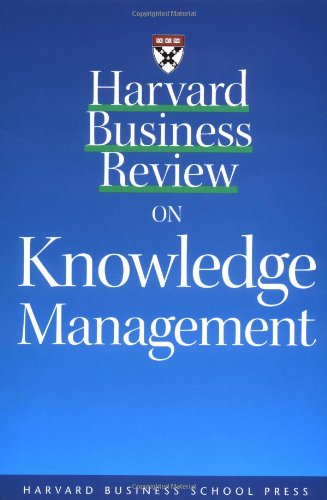The large business 20 years hence is more likely to resemble a hospital or a symphony than a typical manufacturing company. – Peter Drucker, 1988

Why did I chose this resource?
This book walked into my life. I think I was browsing through books someone was going to throw away or a “free library” and I picked it up. I’ve had it for a few years and it seemed apt for me to read it as I started to create company policy around knowledge management for our firm. This is a dense book, so I’m going to do a chapter at a time.
What did you learn from it?
The modern business enterprise has only existed for the last 100 years, and management was separated from “ownership” or “leadership.” Thus, the corporation became stratified and added layers of upon layers of managers. These managers were responsible for moving information / knowledge from the top down to the bottom. Today, that’s different. Knowledge is everywhere, especially at the “bottom” and “management’s” job is to orchestrate rather than command. This is fundamentally why I chose to create “Responsibility Areas” without knowing it.
Key Knowledge
- The best large organization will have no middle management at all. The knowledge is the manager: a combination of policy from the top and knowledge from every where.
- The British Raj or occupation of India : Centralized planning, Decentralized execution by informed leadership without too many layers.
- Information changes decision making from analysis of data to acting on a policy.
- Sequence to Synchrony : Teams working together get more done, not one after another.
- To be competitive , we have to be a team of knowledgeable specialists. E.g. “Enterprise Development” not “Salesman” ; “Internet Architects” not Web Developers; “Internet Strategists” not “Online marketers”; “Enterprise Operators” not “Project Managers”.
- Critical factors of success in the future:
- Developing rewards, recognition, and career opportunities for specialists.
- Creating unified vision in an organization of specialists.
- Devising the management structure for an organization of task forces.
- Ensuring the supply, preparation, and testing of top management people.
- Challenge will be to mitigate who is the manager, where do executives come from? The specialists or the administrators? Not an easy answer.
How are you using what you learned?
We are a progressive organization because we don’t use standard “departments” yet see the value in certain structures. We are starting to understand and leverage basic elements of knowledge management, intuitively and through experience. We need to think about the knowledge problem not just for our own company, but for every company in the world to help them become learning organizations like us. Our success lies in solving our problems first, and showing others by example. Our success lies in solving problems of the future, today.
Key Changes
- Expand on knowledge management policy.
- Incentivize de-centralized knowledge gathering and creation, with multi-level curation, guided by centralized policy.
- Centralized kaizen feedback and create more actionable knowledge by doing monthly reports of progress from weekly evaluations.
How can we as a company or individuals in the company use this?
Our company is all about knowledge. Knowledge industry, market, company, client, projects, practice, responsibility, tools, resources, and people make up our knowledge base. We are a knowledge company. We need to be better at managing it.
Key Actions
- Create one process for knowledge gathering, creation, and distribution.
- Create one page where it defines what knowledge is where : e.g. Dropbox “Assets” or “Knowledge” folder, Google Drive, Leaves, KB, Anant.Wordpress.com, Asitchanges.com, etc..
- Index all of our SaaS solutions into one place using our search engine.
- Push ahead with Gravitron Engine (organize Knowledge & Relationships with machine intelligence)
- All people learn through our knowledge / learning management system — continuously.
- Make this work in our company, then distribute the software and the knowledge.
Source
- Name : HBR on Knowledge Management
- Author : Compiled
- Physical Book: DC Office

